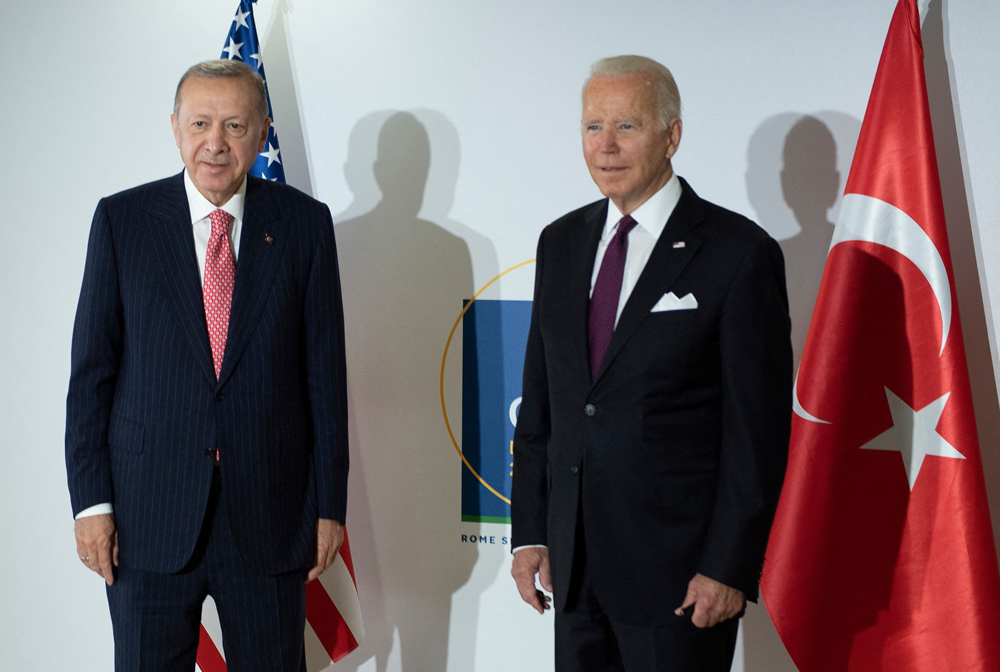In this mailing: - Burak Bekdil: Why Is Democratic Biden Rescuing Autocratic Erdoğan at the Expense of U.S. Allies?
- Lawrence A. Franklin: Pakistan's Taliban Plans
by Burak Bekdil • February 24, 2022 at 5:00 am In early January... in a bolder, less expected and potentially damaging geostrategic move that angered all four of Turkey's Mediterranean rivals (Greece, Cyprus, Israel and Egypt), the Biden administration silently abandoned an eastern Mediterranean pipeline project (EastMed) that would carry Israeli gas through Cyprus to Europe. "By undermining the project, the administration is undercutting three of our strongest allies in the region: Israel, Greece, and Cyprus, as well as the European Union's hopes for energy independence and economic prosperity." — Press release published on the congressional website of U.S. House Representative Gus Bilirakis, January 24, 2022. "The Biden administration's actions in this matter are particularly objectionable and hypocritical in light of its tacit approval of Russia's Nord Stream pipeline, which will only deepen Europe's energy dependence on a volatile adversary." — Rep. Gus Bilirakis, January 24, 2022, A nosediving, cash-strapped economy, international isolation and plummeting popularity have put Erdoğan back on the defensive. Is Biden actually trying to destabilize this part of the world by provoking Erdoğan's assertive aspirations just when they had been -- possibly temporarily -- buried?
 In just over one year in office, U.S. President Joe Biden has swung from a pledge to oust Turkey's Islamist autocrat, President Recep Tayyip Erdoğan, to occasionally appease him, first behind doors, and now publicly. Pictured: Biden meets with Erdoğan during the G20 Summit on October 31, 2021, in Rome, Italy. (Photo by Brendan Smialowski/AFP via Getty Images) In just over one year in office, U.S. President Joe Biden has swung from a pledge to oust Turkey's Islamist autocrat, President Recep Tayyip Erdoğan, to occasionally appease him, first behind doors, and now publicly. Appearing to detest Erdoğan's suffocating regime, increasingly Islamist governance and pro-Russian aspirations, Biden, a year before he became president, had described Erdoğan as an autocrat and promised to empower Turkey's opposition parties through democratic processes. Biden, the fourth U.S. president to work with Erdoğan, avoided any contact with the Turkish leader until April 23, 2021. Then, when Biden did address Turkey, he had bad news: Biden would be the first U.S. president officially to recognize the 1915-1919 mass-murders of Christian Armenians under the Ottoman Empire as a genocide. Continue Reading Article by Lawrence A. Franklin • February 24, 2022 at 4:00 am Pakistan's Taliban movement, led by its most vicious and largest group, Tehrik-e-Taliban Pakistan (TTP) and apparently buoyed by the recent triumph of their ethnic Pashtun cousins in Afghanistan, is revitalizing its strategy either for regional autonomy or to overthrow Pakistan's government and replace it with an Islamic Emirate of Pakistan -- a Pashtunistan made up of Pashtuns, an ethnic group in central Asia -- under Sharia law. Pakistan has been facing an ongoing internal threat to its sovereignty from its Pakistani Taliban. The confrontation has greatly increased since the victory of Afghanistan's Taliban over the United States last August. Pakistan's ISI will likely try to influence its former apprentices in Afghanistan's Taliban, some of whom now serve in Afghanistan's cabinet, to discourage any effort to unite with the Pakistani Taliban to destabilize Pakistan. At present, however, Pakistan's government appears entangled in a struggle to preserve its sovereignty against an energized and relentless Islamic insurgency.
 Pakistan has been facing an ongoing internal threat to its sovereignty from its Pakistani Taliban. The confrontation has greatly increased since the victory of Afghanistan's Taliban over the United States last August. Pictured: Pakistani soldiers stand guard next to an armored vehicle on the border with Afghanistan in Chaman on October 5, 2021. (Photo by AFP via Getty Images) Pakistan's Taliban movement, led by its most vicious and largest group, Tehrik-e-Taliban Pakistan (TTP) and apparently buoyed by the recent triumph of their ethnic Pashtun cousins in Afghanistan, is revitalizing its strategy either for regional autonomy or to overthrow Pakistan's government and replace it with an Islamic Emirate of Pakistan -- a Pashtunistan made up of Pashtuns, an ethnic group in central Asia -- under Sharia law. Pakistan has been facing an ongoing internal threat to its sovereignty from its Pakistani Taliban. The confrontation has greatly increased since the victory of Afghanistan's Taliban over the United States last August. The TTP, according to the Carnegie Council, "is the largest militant organization fighting against the state in Pakistan. According to the UN, the TTP also boasts several thousand fighters in Afghanistan, with strongholds on both sides of the Afghanistan-Pakistan border." Continue Reading Article |
|
|
No comments:
Post a Comment